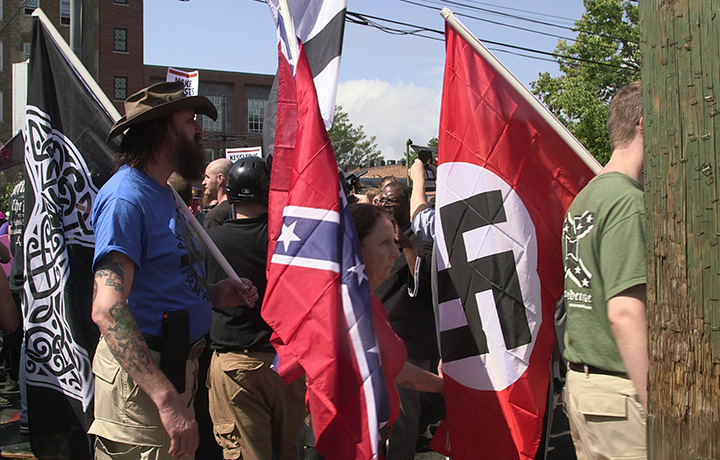Hamilton is set to ban the public display of symbols deemed to promote hate from all city owned lands.

Signs and decorations, particularly the Confederate flag and the Nazi swastika, are just some of the examples targeted in a city staff report on Monday which offered recommendations to fight racism and discrimination in the municipality.
Following the acceptance of the study before the general issues committee, councillors directed staff to begin working on an amendment to Hamilton’s sign bylaw (10-197) to prohibit expressions and symbols associated with hate, profanity or obscenity as defined by Ontario’s Human Rights Code.
City staff have also been directed to create a hate-prevention “action plan” based on findings in the Hate Flags and Symbols report.
Mayor Fred Eisenberger and the municipality are expected to petition the federal government to “clarify and strengthen the definition of hate speech,” including a specific recognition of the “psychological harm” caused by hate-linked symbols to survivors of racism and other forms of discrimination.

Get daily National news
The bylaw amendment would allow for the city to remove, with or without notice, any sign or decoration determined to be for an unlawful activity associated with hate.
However, an excerpt in the report says the city would not have jurisdiction to take action on private property displays unless an expression falls under section 319 of the Criminal Code and is being used to promote or incite hatred or violence against an identifiable group.
Eighteen recommendations were brought forward by the study created through Sage Solutions via community engagement activities responding to high numbers of hate-related incidents reported to Hamilton police in 2020 and 2021.
Mouna Biles, from the Hamilton Community Legal Clinic, endorsed the ban and urged the prioritizing of several recommendations in front of councillors, including accelerating responses to hate, following through on previous recommendations from the community, and listening to feedback from those who have experienced hate.
Other recommendations from the report include being “firmer” with condemning hateful activities, include more diverse representation in decision making as well as collaborating with community groups and school boards on educating youth on racism and equity.
Kojo Damptey, interim executive director of the Hamilton Centre for Civic Inclusion, suggested financial resources for the action plan will need to be “three times as much” as what is now spent by the city on incident response.
“We should think of hate crimes as message crimes,” said Damptey, who added some symbols suggest certain groups do not belong in a given community.
“If we want to build a better Hamilton, we have to say that we do not accept these hate messages and we’re going to do everything we can to prevent these messages.”












Comments
Want to discuss? Please read our Commenting Policy first.